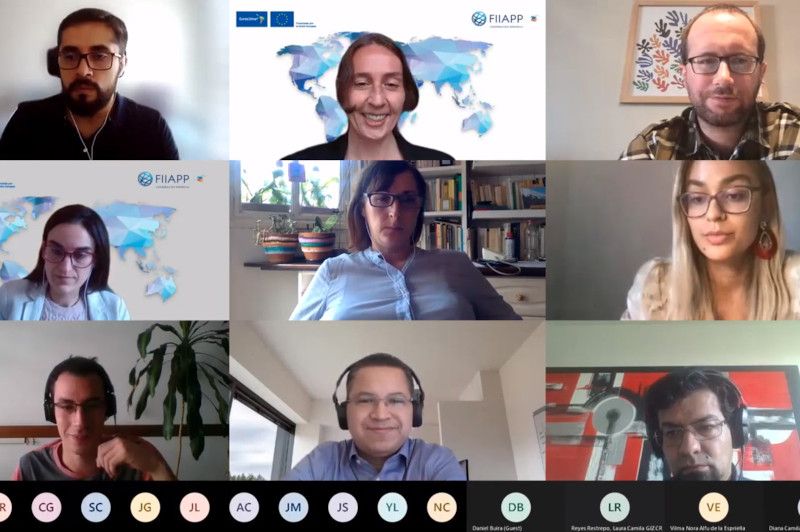The meeting provided an opportunity to discuss the different approaches used in the framework for planning, developing and implementing long-term strategies (LTS) in the region.
On Monday, April 19, a new virtual meeting took place under the framework of the Regional Collaboration for transparency and compliance with the NDCs and generation of Long-Term Climate Strategies, an action developed by the EUROCLIMA+ programme through the implementing agencies FIIAPP, GIZ, ECLAC and UN Environment, with the aim of reducing the common gaps in the planning and implementation of climate actions in five Latin American countries: Argentina, Chile, Colombia, Costa Rica and Uruguay.
The development of this action proposes the creation of a network for long-term climate planning, with knowledge and exchange instruments that serve its purpose. It seeks to strengthen the capacities of countries to establish a long-term vision of resilient and low-emission development through long-term climate strategies with a time horizon of 2050.
The meeting aimed to address the different approaches used in the framework for planning, development and implementation of Long-Term Strategies (LTS) in Latin American countries, taking into account the main challenges and opportunities, in order to identify common elements and next steps towards a synergic action that facilitates the path towards decarbonisation and long-term resilience in the region.
The development of an LTS poses various capacity challenges for countries depending on their national circumstances and contextual factors. These include leadership, accessible and good quality information, technical, policy and management skills, especially systematic and long-term thinking; technology development and access, monitoring and evaluation systems, institutional and organisational arrangements (governance), education systems, the capacity to bridge infrastructure gaps, and policy and legislative frameworks. The proposed network for long-term planning aims to generate technical guidelines to inform the decisions of participating governments for both domestic and multilateral management of these instruments.
About the session
In the session, lessons learned about the processes of preparing LTSs were presented that are being developed in Latin America were presented in order to identify the foundations that the region already has and the international experiences that could enrich these processes. At the same time, a joint reflection was held on the path towards decarbonisation and the role of LTSs in it, recognising that there are still many questions to be answered.
The great effort being made to align the NDC and the LTS towards achieving climate neutrality was highlighted, so that there is greater certainty in the directionality of climate commitments and the targets set in the Paris Agreement can be achieved. To be carbon-neutral in the long term, the short- and medium-term targets set out in some NDCs and aligned with the long-term goal must be met.
While the LTS instrument was originally conceived with a focus on mitigation, attention was drawn to the fact that there is now a trend to integrate very significant elements of adaptation into the LTSs. Although there is still a lot of work to be done in this area, some countries, such as Colombia, are developing innovative methodologies toward this end. There was also agreement on the need to take advantage of existing mechanisms for the implementation of LTSs, without creating new administrative burdens, through schemes that are already being implemented in the countries such as those related to NDCs, and on the importance of involving the private sector, and not just the public sector, and the work that remains to be done in this regard.
Moreover, cross-cutting issues that should be considered in the preparation of Long-Term Climate Strategies, such as the gender approach and just transition, were also addressed. Also highlighted were the importance of roadmaps outlining how to integrate the participation of indigenous communities, generational vision and cultural changes, climate migrations, the need to ensure macroeconomic sustainability and fiscal stability and the challenge of integrating these aspects into the LTS, depending on the issues prioritised by each country.
In terms of challenges mentioned in the implementation, some of these include having to deal with uncertainty in the process of developing LTSs, the need for strong participatory instruments that take into account the diversity of society in Latin America in order to achieve greater social positioning, or the need to adapt the legal frameworks that regulate long-term planning processes in order to harmonise traditional policy instruments with new, longer-term ones. In addition, the difficulties sometimes encountered by governments in taking national actions to sub-national levels have also been discussed.
This exchange network will be oriented toward continued sharing of the vision, challenges, and other relevant aspects in the implementation of the LTSs, in order to strengthen methodological consistency in the development of the LTSs, build capacities and identify common elements and next steps towards a synergic action that facilitates the path towards decarbonisation and long-term resilience of the region.
About EUROCLIMA+
EUROCLIMA+ is a programme funded by the European Union to promote environmentally sustainable and climate-resilient development in 18 Latin American countries, particularly for the benefit of the most vulnerable populations. The Programme is implemented under the synergistic work of seven agencies: he Spanish Agency for International Development Cooperation (AECID), the French Development Agency (AFD), the Economic Commission for Latin America and the Caribbean (ECLAC), the German Society for International Cooperation (GIZ), Expertise France (EF), the International and Ibero-America Foundation for Administration and Public Policy (FIIAPP), and UN Environment.

